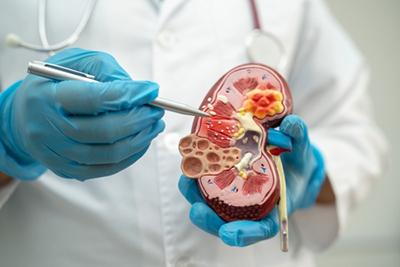
Chronic kidney disease (CKD) is a progressive condition characterized by a gradual loss of kidney function over time. The kidneys play a crucial role in filtering waste and excess fluids from the blood, and as CKD advances, this function becomes impaired. Understanding the stages of CKD is essential for early detection, effective management, and slowing the disease's progression. Your doctors at Iowa Kidney Physicians in Des Moines, IA, can explain the stages of chronic kidney disease and how to get the care that you need.
Understanding The Stages of Chronic Kidney Disease
Like many diseases, there are different stages to chronic kidney disease and it’s important to talk to your doctor in Des Moines, IA, about how each stage might look. Typically, the earlier you’re able to get treatment, the easier it is to manage.
Stage one of CKD typically includes normal function. In this stage, there is evidence of kidney damage, but the kidneys are still functioning normally, with a Glomerular Filtration Rate (GFR) of 90 or higher. Often, there are no noticeable symptoms at this stage. Kidney damage may be detected through abnormal urine or blood tests. It’s important to focus on addressing risk factors such as high blood pressure, diabetes, and lifestyle modifications, including a healthy diet and regular exercise.
Stage two includes mild kidney damage. The GFR is slightly reduced, ranging from 60 to 89. Kidney damage typically is more apparent but still relatively mild. Symptoms may still be minimal or absent. Some patients might notice mild symptoms like fatigue or changes in urine output. Management includes regular monitoring of kidney function, controlling blood pressure and blood sugar levels, and maintaining a healthy lifestyle.
Stage three is more moderate kidney damage. Symptoms may become more noticeable, including fatigue, swelling in the extremities, changes in urine color or frequency, and possibly mild anemia. Treatment is more intensive management of underlying conditions, dietary adjustments (such as reduced protein intake), and possible medication to manage symptoms and slow progression.
As stages get higher, kidney damage progresses further. At stage four, you’ll be dealing with severe kidney damage. Symptoms become more pronounced and may include severe fatigue, swelling, difficulty concentrating, loss of appetite, and muscle cramps. Management includes preparing for potential kidney replacement therapy (dialysis or transplant), strict management of blood pressure, dietary restrictions, and close monitoring by a nephrologist.
Stage five is end-stage renal disease. This indicates that kidneys have lost almost all function. Symptoms are severe and can include nausea, vomiting, difficulty breathing, and confusion. This stage is life-threatening without dialysis or a kidney transplant. Dialysis or a kidney transplant are necessary to sustain life. The focus is on managing symptoms, preventing complications, and improving quality of life.
Contact Our Doctor Today
Make sure you understand the stages of kidney disease. Contact your doctors at Iowa Kidney Physicians in Des Moines, IA, to learn more about chronic kidney disease and how it can affect you at every stage. Call for more information today at (515) 336-6557 for one of two offices in Des Moines, IA.
